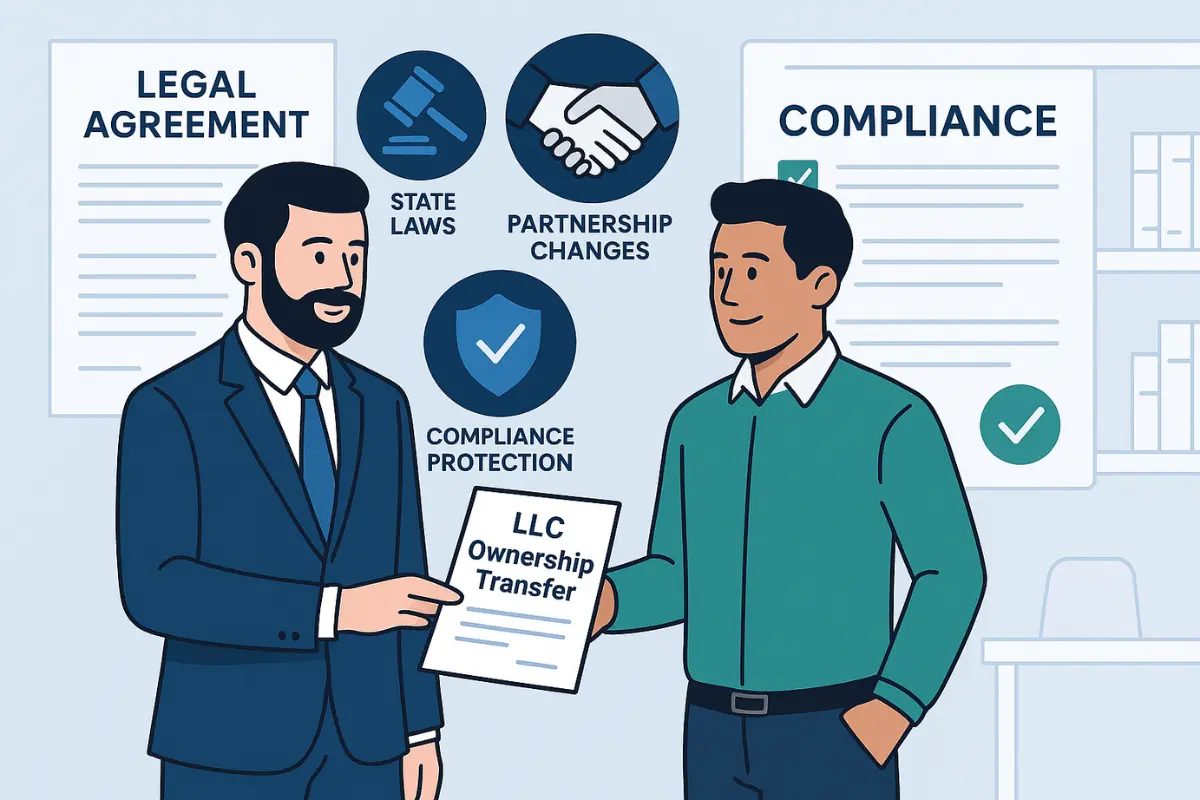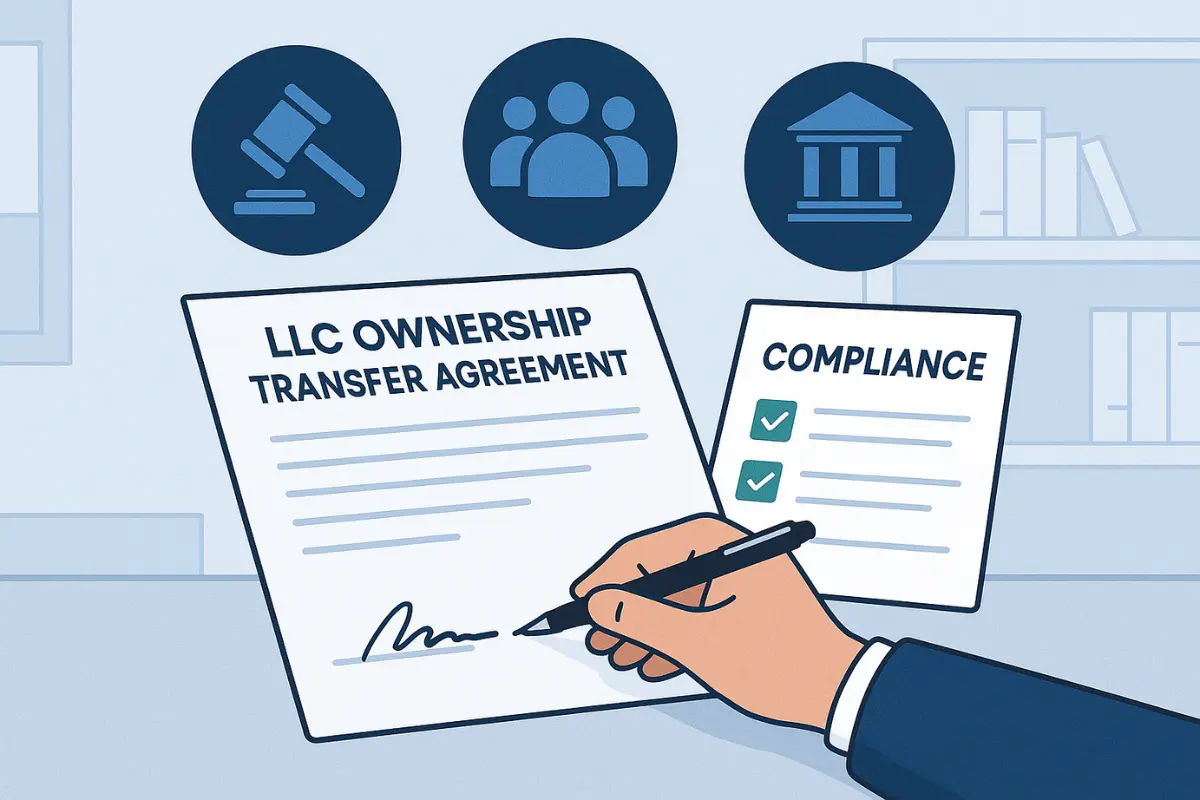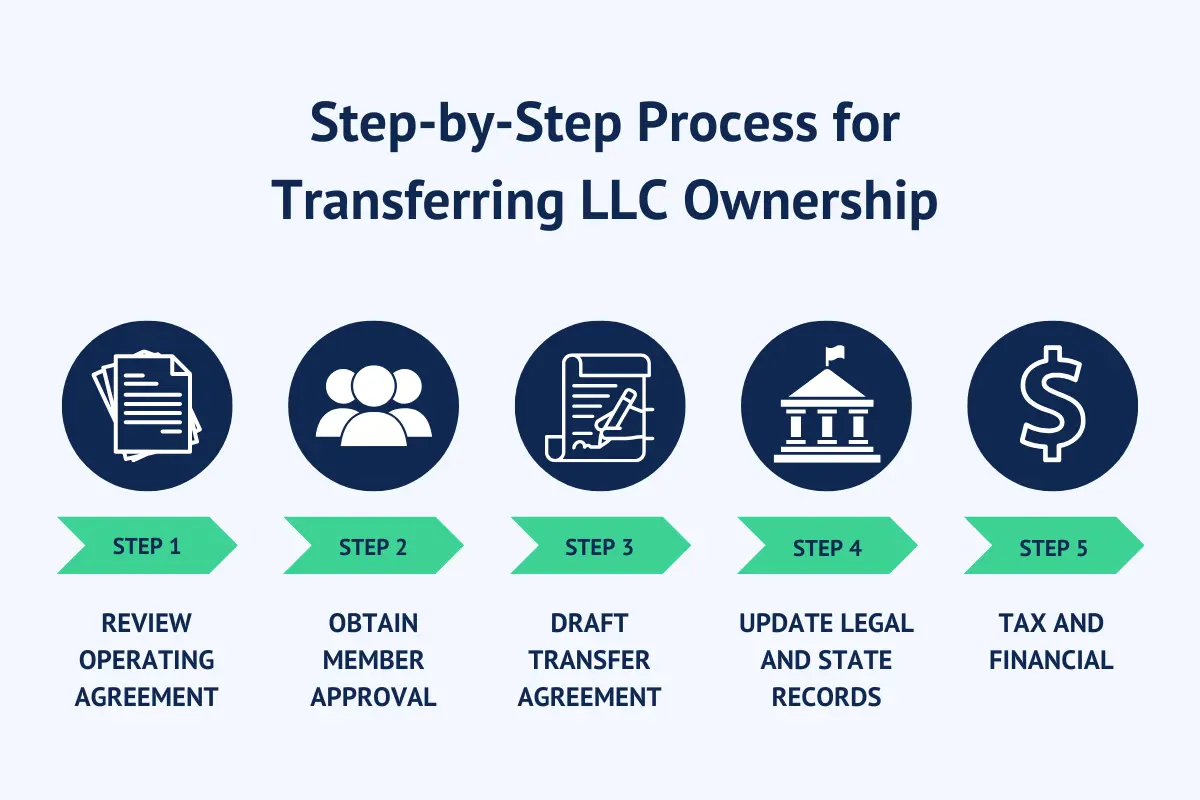Can You Transfer Ownership of an LLC?

The short answer is yes. You can transfer ownership of an LLC, but the process is rarely as simple as handing over a set of keys. Your ability to do so hinges on two critical factors: the rules laid out in your operating agreement and the specific laws of your state. Whether you’re selling your business, bringing in a new partner, or planning your estate, approaching this transfer of ownership incorrectly can lead to legal disputes, tax penalties, and compliance nightmares. The difference between a smooth transition and a costly legal battle often comes down to preparation and precise execution. For over twenty five years, InCorp has supported business owners through complex transitions by handling essential state filings and registered agent duties, helping keep LLC ownership changes properly documented.

Understanding LLC Ownership Structure
Unlike corporations that issue shares of stock to shareholders, a limited liability company is owned by its members, who hold membership interests—often expressed as membership units. These units represent a member's financial and managerial stake in the business, similar to shares in a corporation but with more flexibility in how they’re structured and transferred.
The dynamics of an LLC ownership transfer change dramatically based on the number of members. A single-member LLC has one owner who typically has full autonomy to sell or assign their interest. A multi-member LLC, however, typically operates more like a partnership, where each member’s actions can impact the others. This is why the operating agreement—the governing document for your LLC—is not just important; it is essential. It dictates the rules for transferring LLC membership interest or units, protecting all parties involved. Choosing the right business structure from the start provides this crucial flexibility for future changes.
Can You Legally Transfer LLC Ownership?
Absolutely. LLC ownership can be legally transferred, but the process is not standardized and can vary by state and by the LLC's governing documents. Your company’s operating agreement is the first and most important authority. It may require you to obtain unanimous or majority consent from other members before a transfer, impose a right of first refusal giving existing members the option to buy the interest, or even outright prohibit transfers to outside parties.
If your LLC lacks an operating agreement, default LLC laws will apply. These statutes often include restrictive provisions that can complicate a sale or transfer, making the process slower and more complex.. A legally sound transfer requires strict adherence to the company's operating agreement or state law proper documentation, and timely filings with your state’s secretary of state to update the official record of members.

Common Scenarios for LLC Ownership Transfer
Ownership changes for various reasons, each with its own unique pathway and set of challenges. Understanding your specific scenario is the first step toward a legal and documented transfer.
Selling Your Entire LLC
Selling 100% of your LLC is effectively the sale of your entire business, which can be structured as either a sale of all membership interests or as an asset sale, depending on the agreement between parties. Understanding how to sell an LLC involves determining the market value of the company through a thorough business valuation, negotiating a purchase agreement with the buyer, and executing a formal assignment of all membership interests. The new owner(s) will then need to update the LLC’s state filings (often through an amendment to the articles of organization)and adopt a new operating agreement. This process severs your ties to the business completely.
Partial Ownership Transfer
An LLC partial ownership transfer occurs when one member sells a percentage of their membership interest to either an existing member or an outside third party, while retaining the remaining portion of their ownership. This is common when a partner wants to exit the business while the others continue operating. The operating agreement almost always dictates this process, requiring approval from other members. This prevents an unwanted third party from suddenly becoming your business partner. This scenario is a key reason many sole proprietors choose to convert to an LLC—to establish a clear framework for bringing on partners later.
Adding or Removing Members
This scenario involves changing the membership roster without a direct sale. New LLC members might be added by making a capital contribution in exchange for a new membership interest, which may dilute existing members’ percentages. Conversely, a departing member may exit by having their interest bought out by the LLC or the remaining members. In both cases, the LLC’s operating agreement and the official state record must be updated to reflect the new ownership structure. Choosing the right business partner from the start makes this process far smoother.
Ownership Transfer Due to Death or Divorce
Without a plan, life events such as when an LLC member dies or goes through a divorce can paralyze a business. If a member passes away, their membership interest becomes part of their estate and is transferred to their heirs or beneficiaries, subject to any restrictions in the operating agreement A divorce settlement may award a portion of a member’s interest to an ex-spouse. In both cases, the result could be an unprepared or unqualified individual becoming a legal owner. A well-drafted operating agreement with an integrated buy-sell agreement is the strongest defense against this, mandating how an interest must be valued and reacquired by the LLC or other members in these situations.
Step-by-Step Process for Transferring LLC Ownership
Following a disciplined, step-by-step approach is the only way to ensure your LLC ownership transfer is legally binding and compliant. Before starting the process, reviewing your LLC's operating agreement and related documents is essential to identify any requirements or restrictions regarding ownership changes.

Review the Operating Agreement
This is your non-negotiable first step. Your operating agreement is the rulebook. It will specify the procedures for a transfer, including any approval requirements, valuation methods for the membership interest, and restrictions on who can become a member. If you don’t have one, state law will dictate the ownership transfer process, which can be cumbersome and may not align with your intentions. This is why the question, Do I need an operating agreement for my LLC?, is so critical—the answer is always yes.
Obtain Member Approval
For multi-member LLCs, you must formally obtain the consent required by your operating agreement. All members must have agreed to the transfer and its terms before proceeding. All members must agree to the transfer process, as required by the operating agreement. This usually means holding a meeting and taking a vote of the members. This approval must be documented in writing through meeting minutes or a unanimous written consent resolution signed by all members. Skipping this step or doing it informally may invalidate the transfer.
Draft a Transfer Agreement
This legal contract formalizes the transaction. The buy-sell agreement should detail the sale price, payment terms, the percentage of membership interest being transferred, and representations and warranties from both parties. It legally binds the buyer and seller to the terms of the deal and protects both parties from future disputes.
Update Legal and State Records
With the agreement signed, you must update all relevant records. This almost always involves filing formal paperwork, often called Articles of Amendment or a Statement of Change of Members, with your state’s secretary of state. If the ownership change requires it, you should also update the LLC’s employer identification number (EIN) with the IRS to ensure compliance and proper tax handling. You must also amend the LLC’s operating agreement to add the new member and remove the departing one. Many states offer online portals for these filings and record searches. For example, the Pennsylvania Department of State provides a portal for such business record searches and changes, and similar resources are available in other states, though the specific filing requirements vary.
Tax & Financial Considerations
An LLC ownership transfer has immediate tax implications. The selling member may face capital gains taxes on the profit from the sale. The LLC itself may need to update its tax elections with the IRS, especially if it is changing from a multi-member to a single-member LLC (or vice versa), as this changes how the entity is taxed. You must obtain a new EIN from the IRS if the transfer results in a change to the LLC’s tax classification; this is referred to as a new employer identification number. Given the significant tax and legal considerations involved, consulting a tax professional is essential to ensure compliance and avoid penalties. It is important to consider all legal and tax considerations when transferring LLC ownership to avoid regulatory issues. Working with tax professionals can help you navigate complex tax regulations and prevent costly mistakes. Additionally, the LLC must update the IRS regarding any change in the LLC’s responsible party by filing the appropriate form.
Note: Be sure to check for any additional state or federal requirements that may apply to your specific situation.
Challenges and Restrictions in Transferring LLC Ownership
Several hurdles can complicate a transfer. State laws vary significantly, and some impose charging orders that can limit a creditor’s or an involuntary recipient’s rights to manage the LLC. The tax implications of a sale can be substantial for the seller. Perhaps the biggest challenge is the potential for disagreement among members over valuation or the suitability of a new owner. These complexities are why professional guidance from lawyers, accountants, and compliance document filing experts like InCorp is not a luxury—it is a necessity for protecting your investment. Having a buy-sell agreement in place before these challenges arise can prevent many disputes.
Alternatives to Transferring Ownership
A direct transfer of ownership isn’t always the only or best option for modifying an LLC’s structure or addressing changes in membership. Depending on your goals, other strategies may better achieve the desired outcome. For example, restructuring through a merger, acquisition, or formation of a foreign LLC can help facilitate new ownership, expand operations, or manage liabilities more strategically. These alternatives often involve additional legal and tax requirements but can provide greater flexibility than a standard ownership transfer.
Dissolving and Forming a New LLC
If the ownership change is especially complex or if the existing LLC has liabilities you want to isolate, you may choose to dissolve the current entity and form a new one with the preferred ownership structure. This approach creates a clean legal slate but comes with costs, paperwork, and the potential loss of the business’s established name and reputation
Merger or Acquisition Option
For larger transactions, structuring the deal as a merger or acquisition might be more strategic. This allows one business to be combined with or absorbed into another, often with favorable tax implications and operational synergies. The Small Business Administration (SBA) guide outlines the considerations for this complex process, which requires significant legal and financial advisory. When transferring LLC membership interest through a merger, the process differs significantly from a standard sale.
Buy-Sell Agreement
The most powerful alternative is to preempt the need for a reactive transfer with a proactive buy-sell agreement. This legally binding contract, often part of the operating agreement, dictates exactly how a membership interest must be valued and sold in predetermined scenarios like death, disability, divorce, or a member's desire to exit. According to Cornell Law School's Legal Information Institute, it is an essential tool for ensuring business continuity and preventing disputes. A comprehensive buy-sell agreement addresses valuation methods, payment terms, and transfer restrictions in advance.
Conclusion
Transferring ownership of an LLC is a powerful tool for business evolution, but it is a process governed by strict legal and compliance rules. Success depends on a well-drafted operating agreement, a meticulous step-by-step process, and an understanding of the tax implications. Whether you are selling, adding a partner, or planning your exit, taking proactive, informed action is the key to a smooth transition. The structure you built your business on should be able to evolve with it.
FAQs
Do I need unanimous consent from all members to transfer LLC ownership?
It depends entirely on your operating agreement. Most multi-member LLC operating agreements require either majority or unanimous consent for a transfer to an outside party. If your agreement is silent, your state's default LLC law will apply, which often includes consent requirements.
Can I transfer ownership of a single-member LLC?
Yes, the process is generally more straightforward for a single-member LLC. The owner can typically sell or assign their entire membership interest without needing approval from other members. However, you must still formally amend the state records and operating agreement to effect the legal transfer.
What happens if there's no Operating Agreement?
Without an operating agreement, your LLC is governed by your state's default LLC statutes. These laws may impose restrictions you wouldn't have chosen, such as requiring unanimous consent for any transfer. This can complicate or even prevent the transfer you want to make, potentially leading to disputes and legal challenges.
Do I need to notify the IRS after transferring ownership?
Yes, with conditions. The IRS doesn't accept a generic "ownership transfer" notice, but updates are required if the transfer changes IRS records or tax treatment: file Form 8822‑B within 60 days if the EIN's responsible party or business address changes, report any change in federal tax classification (for example, multi‑member partnership to single‑member disregarded entity) on that year's return or by filing the appropriate election (Form 8832/2553) if choosing or changing corporate/S status, and review the IRS rules to determine whether a new EIN is required; otherwise, no separate filing is made solely to report an ownership transfer. Maintaining accurate records, such as those required by small business administration reports, is essential to ensure compliance and reduce audit risks—especially as your business expands or undergoes significant changes.
How InCorp Can Help with LLC Ownership Transfers
Transferring LLC ownership involves both legal documentation and state record updates. While InCorp does not provide legal advice or direct transactional support, our services ensure that your business filings and state records remain accurate throughout the process. We prepare and submit the necessary state forms—such as Articles of Amendment or Statements of Change—to update information with the secretary of state. As your registered agent in all 50 states, we receive and forward official notices, legal documents, and state correspondence to help you stay in good standing. For companies that operate in multiple states, we also coordinate registered agent coverage and filing assistance across jurisdictions. InCorp handles the administrative filings and maintenance so you can focus on completing the ownership transfer with confidence. Contact us today to learn how we can support your LLC ownership transfer needs.
Share This Article:
Stay in the know!
Join our newsletter for special offers.